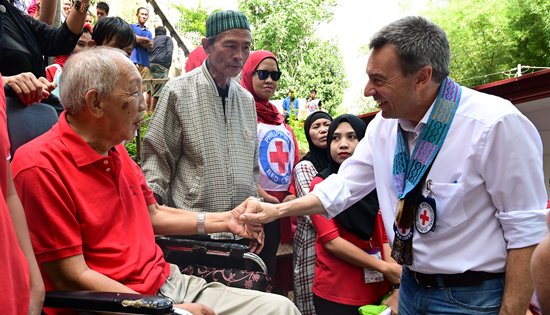Statement of ICRC
President Peter Maurer following visit to the Philippines
4 June 2019
|

In
his visit to Bualan spring, ICRC President Peter Maurer met
community leader Datu Caloy Amer, who let the organization
improve the water and sanitation facility on the land his
family owns. (ICRC/Alecs Ongcal) |
The remarkable resilience
of the Filipino people became clear to me when I first visited after
the devastation of Typhoon Haiyan in 2013. I returned this week to
listen, to discuss, to offer support and encourage action as the
country again embraces challenges and assists those in need.
This second visit affirms
my view that the suffering people endure in natural and manmade
disasters is universal. People lose loved ones. People lose their
homes. Individuals and whole communities face an uncertain future.
In my interactions with
conflict-affected people around the globe, their questions are
strikingly similar: When are we going to be safe from fighting? When
can I rebuild my house? How can I earn a more stable income? Where
can I get clean water today? When can I be reunited with my loved
one?
The 2017 devastation of
Marawi City brought the Philippinesí armed conflicts to the global
forefront. But for decades, many more communities in Maguindanao,
Basilan, Sulu and portions of eastern Mindanao have been forced to
flee their homes multiple times. Sporadic clashes deeply affect
these familiesí livelihoods, their ability to put food on the table,
and their ability to send their children to school. It is a life of
instability and uncertainty, and many people are living it daily,
often long after the news headlines move on to another crisis or
emergency.
In my visit to Marawi City
this week, I saw a community dealing with the physical and
psychological impact of conflict. I met a family of a missing person
that hasnít lost hope that news about their relative will arrive
soon. I also saw how people we are assisting are making the most of
that support, for instance a mother that has opened a small business
selling food. I observed firsthand a people that will not let the
conflict of 2017 defeat their spirit. Local Red Cross volunteers I
met have been unrelenting in their support to the displaced people.
In my discussions with
high-ranking officials, I felt a commitment and resolve to find
effective, long-term solutions to humanitarian issues of concern,
despite considerable constraints they deal with. The people need to
be able to count on the authorities to be responsive to their needs.
I see indicators of hope,
fortitude, and of shared determination to rise from the ravages of
the conflict in Marawi and other areas in Mindanao still affected by
sporadic armed fighting.
Nevertheless, in talking
to victims, responders and authorities, I can see that the work is
not yet done. Though responding to humanitarian needs due to
conflict is the work of the International Committee of the Red
Cross, I believe equally that all members of society have a shared
responsibility to provide reprieve to those affected by fighting.
We all need to do more in
our respective roles. We need to do better at addressing the
consequences of conflict, but also, we need to do better in
preventing or reducing those consequences.
The ICRC has long
experience in dealing with conflict situations, as an impartial and
neutral organization. We offer our varied expertise and support.
Together with our partners in the Red Cross, we will strive to reach
and assist those affected by conflict, no matter who or how far they
are.
The ICRC will continue to
promote principles of humanity and maintain our positive
collaboration with the Philippine authorities at national and local
levels, as they have the primary responsibility to address
humanitarian concerns of their people.
If our common aspiration
is that no person suffering the consequences of conflict is left
behind, then letís all get to work.